Do you feel the sand between your toes and hear the gentle crash of the waves? Ah, the beach, a place of freedom and tranquility. But wait, before you start collecting those beautiful shells scattered along the shore, have you ever stopped to consider the impact of your actions? Welcome to the world of ethical beachcombing, where the freedom to enjoy nature comes with a responsibility to protect it.
In this article, we will explore the question: should you take shells from the beach? We will delve into the importance of preserving beach ecosystems, the cultural and historical significance of shells, and responsible beachcombing practices. We will also discuss the impact of overcollecting on beaches and provide alternatives to collecting shells.
So, grab your sunscreen and let’s embark on a journey to find the balance between enjoying beachcombing and protecting the environment.
Key Takeaways
- Ethical beachcombing involves considering the impact of taking shells from the beach.
- Removing shells disrupts the natural balance of beach ecosystems and can lead to population decline and extinction.
- Shells have cultural and historical significance, being used as currency and in religious rituals.
– Practicing ethical beachcombing strikes a balance between enjoying shells and preserving their significance.
The Importance of Preserving Beach Ecosystems
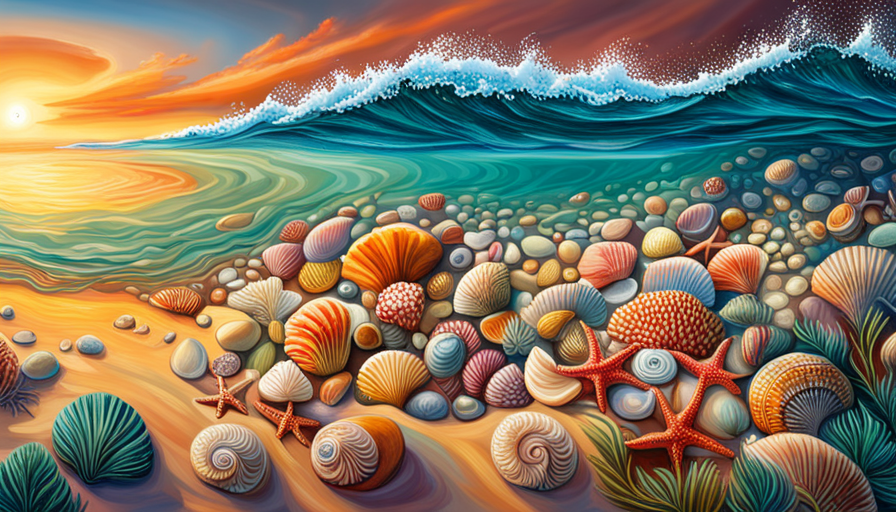
You can’t imagine the vibrant and delicate ecosystems that thrive on the beach, so please don’t take shells that serve as vital homes and protection for countless creatures. Preserving biodiversity and understanding the ecological importance of beach ecosystems is crucial for maintaining a healthy and balanced environment.
Beaches are not just stretches of sand and water; they are intricate habitats that support a wide range of life. The shells you find on the beach may seem like mere souvenirs, but they play a significant role in preserving biodiversity. Many species of marine organisms, such as hermit crabs and small mollusks, rely on shells as their homes. These shells provide protection from predators and harsh environmental conditions, ensuring their survival.
Removing shells from the beach disrupts the natural balance of these ecosystems. It deprives numerous creatures of their homes, which can lead to population decline and even extinction in some cases. Additionally, shells provide a crucial source of calcium carbonate, an essential nutrient for many marine organisms.
By leaving the shells where they belong, you allow the beach ecosystem to continue its natural processes and support a diverse range of life.
By refraining from taking shells from the beach, you contribute to the preservation of these vital ecosystems. It is our responsibility to respect and protect the delicate balance of nature, ensuring that future generations can also enjoy the beauty and ecological richness of the beach.
Let’s strive to be responsible beachcombers and leave shells where they belong, embracing the freedom to appreciate and protect the wonders of nature.
Cultural and Historical Significance of Shells
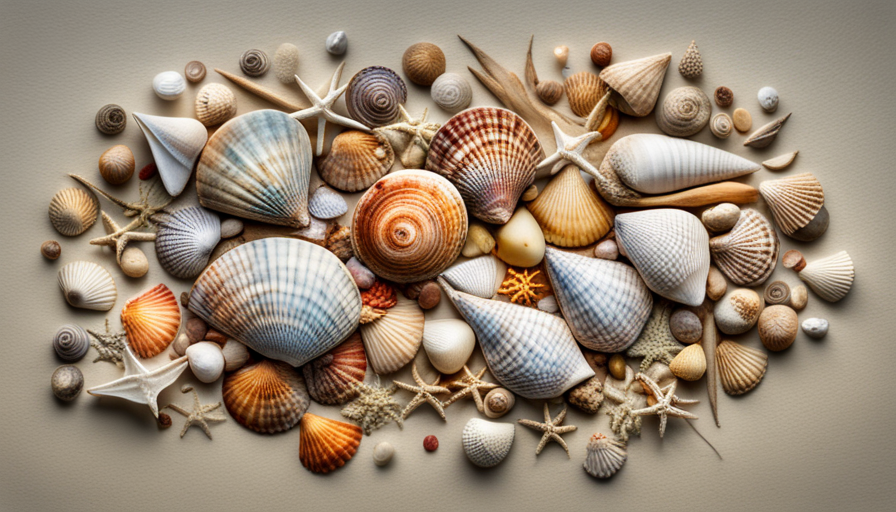
The cultural and historical significance of shells can be truly fascinating. Shells have played a significant role in various cultures throughout history, serving as symbols of status, spirituality, and artistic expression.
In ancient civilizations, shells were often used as currency, demonstrating their value and importance. They were also used in religious rituals and ceremonies, believed to possess spiritual powers and connections to the divine.
Furthermore, shells have been utilized in art and design for centuries. From intricate shell mosaics in ancient Roman villas to delicate shell jewelry crafted by indigenous cultures, shells have been admired for their natural beauty and used as a medium for artistic expression. They have also been incorporated into traditional garments, architecture, and decorative objects, showcasing their cultural significance and aesthetic appeal.
Understanding the cultural and historical significance of shells can enhance our appreciation for these natural treasures. By respecting and preserving shells found on the beach, we can ensure that future generations have the opportunity to learn from and enjoy their beauty.
While it may be tempting to collect shells as souvenirs, it’s important to consider the impact of our actions on the beach ecosystem and the cultural heritage associated with these shells. By practicing ethical beachcombing, we can strike a balance between enjoying the beauty of shells and preserving their cultural and historical significance for the benefit of all.
Responsible Beachcombing Practices

When beachcombing, it’s important to follow the Leave No Trace principles to minimize your impact on the environment. This means leaving the beach as you found it, without taking anything with you.
Additionally, it’s crucial to only collect empty shells, as live shells play an important role in the ecosystem and taking them can disrupt the natural balance.
Leave No Trace Principles
As you stroll along the sandy shore, remember to adhere to the Leave No Trace principles of ethical beachcombing. These principles are essential in minimizing the environmental impact of our activities.
When collecting shells, it’s important to consider the potential harm we may cause to the ecosystem. By leaving shells in their natural environment, we allow them to continue providing shelter and protection for various marine organisms. Additionally, shells play a crucial role in maintaining the balance of coastal ecosystems by providing nutrients and habitat for other organisms.
Taking shells from the beach disrupts this delicate balance and can have long-lasting effects. By following the Leave No Trace principles, we can enjoy beachcombing while preserving the natural beauty and integrity of the environment for future generations to enjoy.
Taking Only Empty Shells
Remember to only collect empty shells during your beach adventures, allowing the marine organisms to continue using them for shelter and protection. By taking only empty shells, you can contribute to the preservation of biodiversity and ecological conservation. When shells are left on the beach, they provide habitats and homes for various organisms such as hermit crabs, small fish, and snails. These organisms rely on the shells for protection against predators and harsh environmental conditions. By removing shells that are still occupied, you disrupt this delicate balance and potentially harm the marine life that depends on them. Preserving the shells on the beach ensures that the natural ecosystem remains intact and allows for the continued survival of these organisms. So next time you’re beachcombing, remember to leave the occupied shells behind and take only the empty ones, helping to protect the fragile marine environment.
| Shells | Benefits | Conservation Tips |
|---|---|---|
| Empty shells | Provide habitats | Only collect empty shells |
| Occupied shells | Shelter for organisms | Leave occupied shells |
| on the beach |
Impact of Overcollecting on Beaches
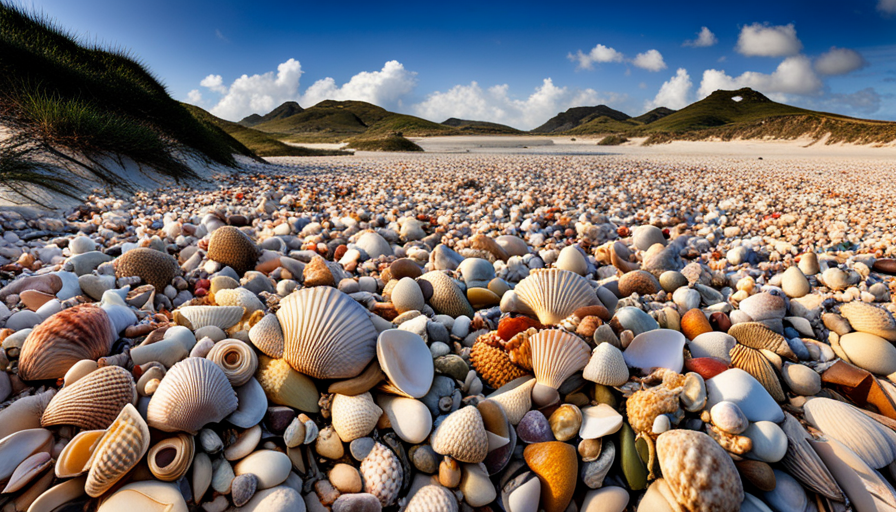
When you overcollect shells and other items from the beach, you disrupt natural erosion and deposition processes. These processes are important for maintaining the balance of sand and sediment on the beach, and when they are disrupted, it can lead to erosion and loss of beachfront.
Additionally, overcollecting shells decreases the aesthetics and enjoyment of the beach for others, as it reduces the natural beauty and diversity of the shoreline.
Disrupting Natural Erosion and Deposition Processes
You can’t help but notice the mesmerizing rhythm of the waves crashing against the shore, as they tirelessly work to shape the coastline through natural erosion and deposition processes. However, when you disrupt these natural ecosystem processes by overcollecting shells from the beach, there can be ecological consequences.
Shells play a crucial role in maintaining the balance of coastal ecosystems. They provide habitats for various marine organisms, act as natural barriers against erosion, and contribute to nutrient cycling. When you remove shells from the beach, you disrupt these important functions. This can lead to increased erosion, loss of habitat for marine life, and altered nutrient levels in the water.
It is essential to be mindful of the impact your actions can have on the delicate balance of coastal ecosystems and consider leaving shells where they belong – on the beach.
Decreasing Beach Aesthetics and Enjoyment
Enhance your beach experience by appreciating the natural beauty and leaving shells undisturbed in their coastal habitat. Not only is it a respectful action, but it also has several benefits for both the environment and your own enjoyment.
- Decreasing beach pollution: By leaving shells in their natural habitat, you help maintain the delicate balance of the ecosystem. Shells provide important homes and habitats for various marine organisms, contributing to a healthy marine environment.
- Impact on marine life: Taking shells from the beach disrupts the natural food chain and can have negative consequences for marine life. Many creatures, such as hermit crabs, rely on shells for protection and shelter. Removing shells can leave these animals vulnerable and disrupt their survival.
- Preserving the beach aesthetic: Leaving shells on the beach allows others to appreciate their natural beauty and adds to the overall aesthetic appeal of the coastal environment. Imagine walking along a pristine shoreline, adorned with untouched shells, enhancing your beach experience.
- Enjoyment for future generations: By preserving the natural state of the beach, we ensure that future generations can enjoy the same beauty and wonder. Leaving shells undisturbed helps to maintain the beach’s allure and provides an opportunity for everyone to connect with nature.
Remember, by leaving shells on the beach, you contribute to decreasing beach pollution, support marine life, preserve the beach’s aesthetic, and ensure enjoyment for future generations. Let’s cherish and respect the natural beauty of our coastal habitats.
Alternatives to Collecting Shells
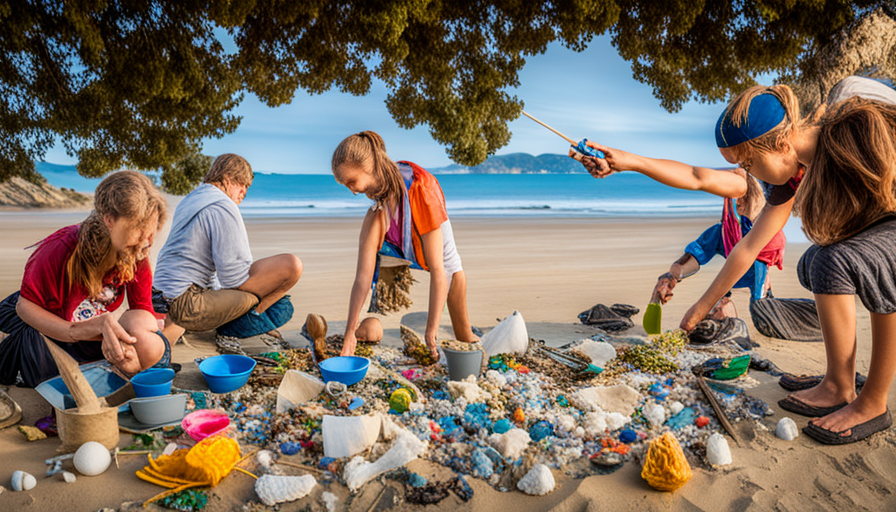
Instead of taking shells from the beach, consider immersing yourself in the beauty of the shoreline by simply admiring and appreciating their natural presence. By refraining from collecting shells, you can contribute to the preservation of beach aesthetics while still enjoying all that the coast has to offer.
There are various alternatives to collecting shells that allow you to engage with the beach in a respectful and ethical manner. One option is to create shell art. Many artists use shells as a medium to create stunning sculptures, mosaics, and jewelry. By using shells that have washed up naturally, you can create beautiful pieces of art without disrupting the beach ecosystem.
Another alternative is beach photography. The beach offers a plethora of natural beauty and unique landscapes that can be captured through the lens of a camera. Photographs can be a powerful way to capture the essence of the beach and share it with others, while leaving the shells undisturbed.
By exploring these alternatives, you can still enjoy the beauty of the beach without compromising its aesthetics or the well-being of its ecosystem. So next time you visit the shore, consider leaving the shells where they belong and find joy in appreciating their natural presence.
Educating Others on Ethical Beachcombing

If you’re passionate about ethical beachcombing, it’s important to educate others on the impact of shell collecting. By spreading awareness about the potential harm to marine ecosystems, you can encourage responsible tourism and conservation efforts.
Highlighting the importance of leaving shells on the beach and promoting sustainable practices can help protect the delicate balance of coastal ecosystems.
Spreading Awareness about the Impact of Shell Collecting
Raising awareness about the impact of shell collecting is crucial in promoting ethical beachcombing practices. By understanding the environmental consequences of the shell trade, individuals can make informed decisions when it comes to collecting shells from the beach.
Here are three key points to consider:
- Disrupting ecosystems: Removing shells from the beach disrupts the natural balance of coastal ecosystems. Shells provide essential habitats and breeding grounds for various marine organisms. Taking them away can have a detrimental impact on these species and their surrounding environment.
- Loss of biodiversity: The shell trade often focuses on collecting rare and exotic shells. This demand leads to overharvesting and can result in the decline of certain shell species. This loss of biodiversity has long-term consequences for the overall health of marine ecosystems.
- Damage to fragile habitats: Collecting shells can lead to habitat destruction as people may inadvertently damage coral reefs, seagrass beds, or other delicate ecosystems while searching for shells. These habitats are crucial for marine life and their destruction can have cascading effects throughout the food chain.
By spreading awareness about these environmental impacts, we can encourage responsible and sustainable beachcombing practices that prioritize the preservation of our coastal ecosystems.
Encouraging Responsible Tourism and Conservation Efforts
Now that you’re aware of the negative impact of shell collecting, let’s discuss how we can encourage responsible tourism and conservation efforts. By adopting a more sustainable approach to beachcombing, we can protect the delicate ecosystems and preserve the natural beauty of our beaches. One way to achieve this is by promoting responsible tourism practices, such as educating visitors about the importance of leaving shells on the beach and avoiding any activities that harm the environment. Additionally, conservation efforts should be supported and encouraged. This can include participating in beach clean-ups, supporting local organizations that protect marine life, and advocating for the establishment of protected areas. By taking these actions, we can ensure that future generations can also enjoy the wonders of the beach while preserving its ecological integrity.
| Responsible Tourism | Conservation Efforts | Impact on Ecosystems |
| Educating visitors about | Participating in beach | Preserving the natural |
| leaving shells on the | clean-ups | beauty of the beaches |
| beach | Supporting local | Protecting marine |
| organizations | life | |
| Advocating for the | Ensuring ecological | |
| establishment of | integrity | |
| protected areas |
Conclusion: Finding the Balance Between Enjoying Beachcombing and Protecting the Environment
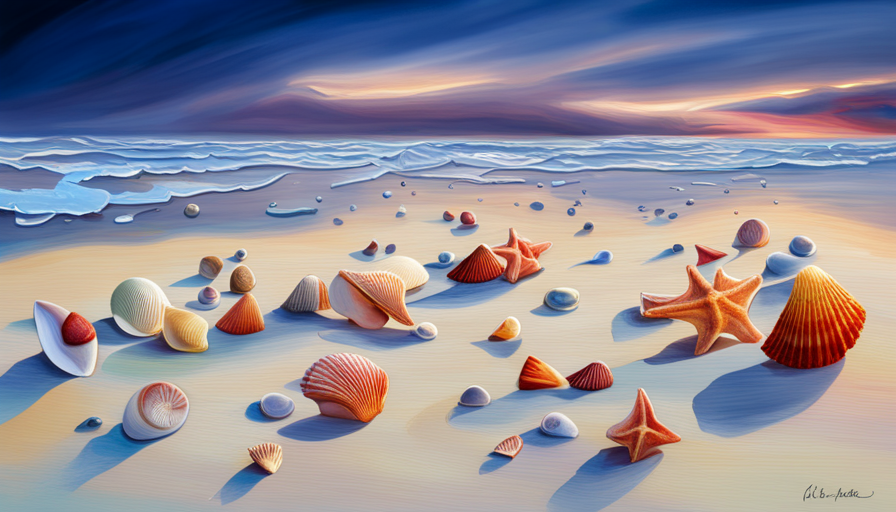
Ultimately, striking a balance between indulging in the joy of beachcombing and safeguarding the fragile ecosystem is a conundrum that requires a dash of common sense and a sprinkle of environmental consciousness. Finding the line between enjoying beachcombing and protecting the environment calls for a thoughtful approach that promotes ethical beachcombing and sustainability.
Responsible beachcombing entails understanding the impact of our actions on the environment. While collecting shells can be a pleasurable activity, it’s important to consider the potential consequences. Taking shells in moderation and leaving behind those that serve as habitats or play a crucial role in the ecosystem is a crucial step towards conservation.
Preserving the natural beauty of the beach is a shared responsibility. Encouraging others to practice ethical beachcombing and conservation efforts can have a significant impact. By setting an example and educating fellow beachcombers about the importance of protecting the environment, we can collectively contribute to the preservation of these delicate ecosystems.
It’s essential to strike a balance between enjoyment and conservation, recognizing that the beach is a shared space that needs to be protected for future generations. By adopting sustainable practices, such as minimizing the use of single-use plastics and respecting wildlife habitats, we can ensure that beachcombing remains an enjoyable and responsible activity for all.
So, let’s embrace the wonders of beachcombing while keeping in mind the importance of preserving our beautiful coastal environments.
Frequently Asked Questions
Are there any legal restrictions on collecting shells from the beach?
There may be legal restrictions on collecting shells from the beach, as some areas have regulations in place to protect the environment. These restrictions aim to minimize the negative environmental impact caused by excessive shell collection.
How can I determine if a shell is alive or empty before taking it?
To determine if a shell is alive or empty before taking it, gently tap it. If it closes, it’s alive and should be left on the beach. Ethical considerations in shell collecting include respecting marine life and preserving the ecosystem.
What should I do if I accidentally damage a live shell while beachcombing?
If you accidentally damage a live shell while beachcombing, immediately report the incident to local authorities or conservation organizations. They can guide you on restoration efforts to help preserve the shell and its habitat.
Are there any specific beaches or regions where shell collecting is prohibited?
There are specific beaches and regions where shell collecting is prohibited due to shell regulations. It is important to be aware of these restrictions to avoid any legal issues while enjoying your freedom at the beach.
What are the potential consequences of overcollecting shells on the local marine ecosystem?
Overcollecting shells can have potential long term effects on the local marine ecosystem. It disrupts the delicate balance of biodiversity, like pulling out pieces of a puzzle, leading to ecological imbalance and loss of species.
Conclusion
In conclusion, ethical beachcombing is crucial to preserving the beauty and health of our beaches. By refraining from taking shells, you can contribute to the protection of beach ecosystems and their delicate balance.
Remember, every shell has a story to tell, and leaving them in their natural habitat allows future visitors to experience the cultural and historical significance they hold.
So, next time you’re tempted to collect shells, think twice and let them be the ‘pearls of the sea’ that enchant others.
